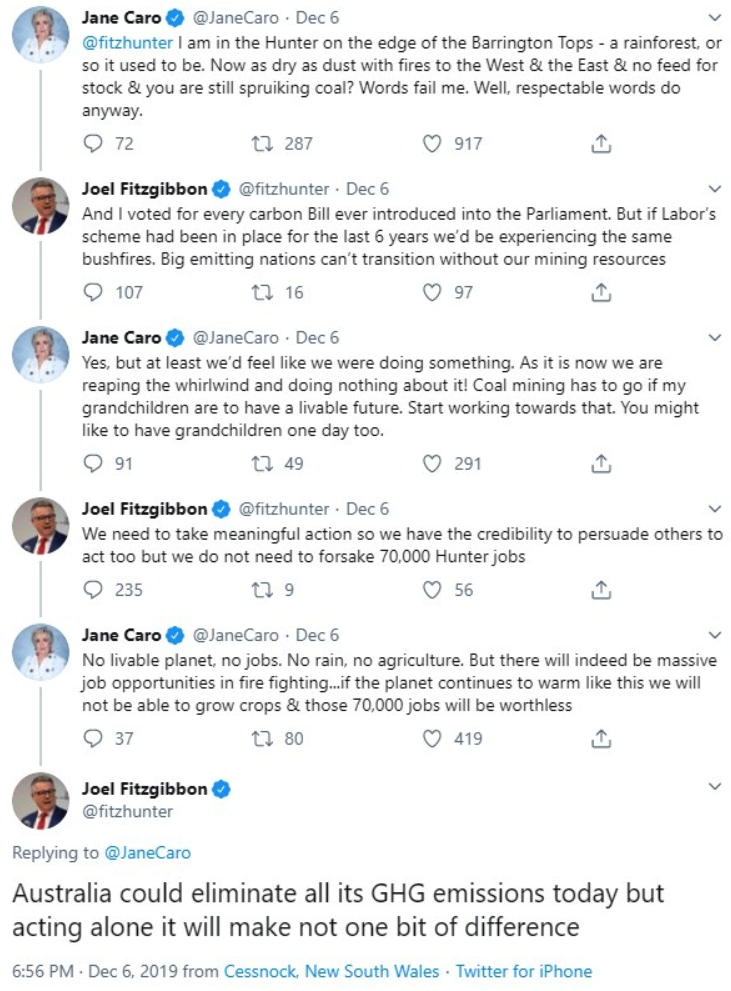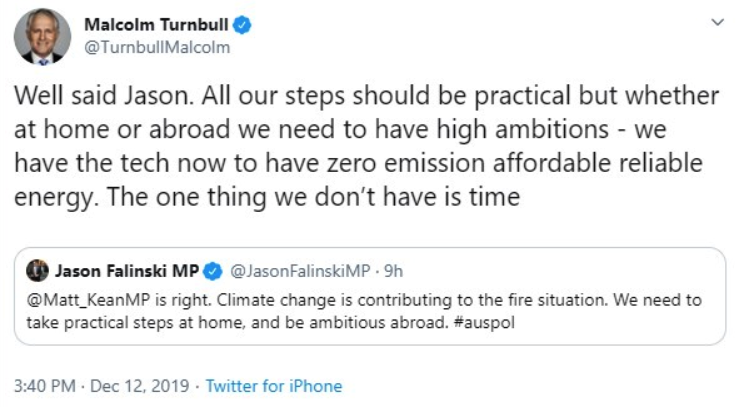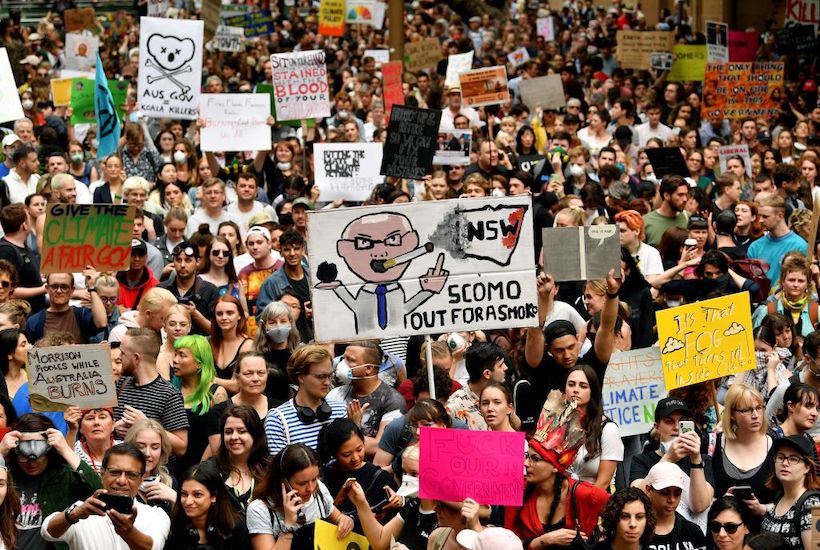Overlooked in all the bushfire brouhaha of last week was a telling exchange between a Labor MP Joel Fitzgibbon (the working class) and a professional Tweeter Jane Caro (the wokeing class) about fires and climate change:

Put aside the whole issue of whether the recent fires in New South Wales and Queensland are somehow caused or contributed to by climate change – many say yes, others argue no – but let’s just assume that the “yeses” are correct. I’m still to hear one rational policy proposal of what governments should or could have done in the past or what the government should do now that would make one iota of difference.
Truth of the matter is even if Australia, with just over one per cent of global CO2 emissions, simply vanished it would make no difference to global temperatures and climate. Fitzgibbon is correct: unless there is concerted global action involving the major emitters such as China, India, the United States and the European Union to reduce or even somehow eliminate the production of greenhouse gases, what Australia does simply doesn’t matter. If Australia went 100 per cent renewable tomorrow, bushfires would still be raging. If we had implemented Kevin Rudd’s ETS ten years ago or kept Julia Gillard’s carbon tax and as a result our emissions were possibly a few percentage points lower than they otherwise are now, farmland, forests and national parks across the nation would still be ablaze.
But, as Caro says, “at least we’d feel like we were doing something”. So it’s all about the “feels”, then.
The problem, of course, is that Australia “doing something” in the absence of others “doing something” too not only would have no impact on the environment but would actually damage our industries, our economy and our standard of living (as bigger taxes, industry closures or higher energy prices inevitably do), disadvantaging us vis-a-vis our competitors and trading partners.
The irony is that the people who argue we should do something so “we’d feel like we were doing something” are usually the same ones who laugh at and disparage those who offer “thought and prayers”. At least thoughts and prayers aren’t doing any harm.
But there more make-believe wherever you turn:

If we indeed have “the tech now to have zero-emission affordable reliable energy”, who’s hiding this miraculous technology from the humanity? Big coal? Big oil? Is this like that old chestnut of the now-enfeebled giants of Detroit suppressing the secrets of the electric car?
Sadly, at the current stage of scientific and technological development, when you talk about “zero emissions”, “affordable” and “reliable”, it’s a game of “pick any two” and only two. Zero emissions and reliable gives us nuclear energy, which is capital intensive. Zero-emission and affordable gives us perhaps some of the better renewable technologies like the thermal energy that powers Iceland. And affordable and reliable gives us fossil fuels. But there simply are no zero-emission technologies available yet that are affordable, in a sense of being competitive with coal or gas in terms of price, as well as reliable, in a sense of being able to provide the base power that any modern economy and society needs in order to function. Perhaps the exception is Iceland’s thermal energy mentioned above but only very few countries in the world are sitting on top of volcanoes. We should certainly be aiming to develop affordable and reliable green energy – if only to make the Middle East irrelevant again – but we’re nowhere near there yet, despite Malcolm’s wishful thinking.
To crown this week of symbolism and make-believe, the once-respected “Time” magazine has named Greta Thunberg its “Person of the Year”. Ironically, this was only a few days after disappointed Greta admitted in Madrid that after more than a year of student strikes “still basically nothing has happened.” Considering that Greta’s vision for the world at best involves completely unworkable $60-trillion-plus schemes and at worst some sort of global eco-communism, I’m rather comforted by this fact.
Between the fantasy world and the totalitarian instincts, I’m not so much a climate change sceptic as a climate changers sceptic.
Arthur Chrenkoff blogs at The Daily Chrenk, where this piece also appears.
Got something to add? Join the discussion and comment below.
Got something to add? Join the discussion and comment below.
Get 10 issues for just $10
Subscribe to The Spectator Australia today for the next 10 magazine issues, plus full online access, for just $10.


























Comments
Don't miss out
Join the conversation with other Spectator Australia readers. Subscribe to leave a comment.
SUBSCRIBEAlready a subscriber? Log in